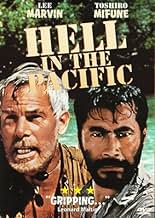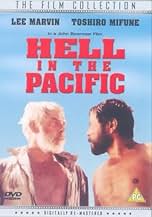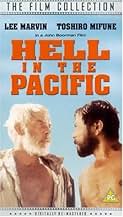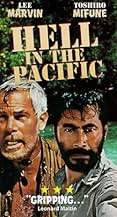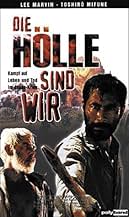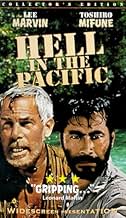NOTE IMDb
7,2/10
9,5 k
MA NOTE
Pendant la Seconde Guerre mondiale, un pilote américain et un capitaine de la marine japonaise abandonnés sont désertés sur une petite île inhabitée de l'océan Pacifique.Pendant la Seconde Guerre mondiale, un pilote américain et un capitaine de la marine japonaise abandonnés sont désertés sur une petite île inhabitée de l'océan Pacifique.Pendant la Seconde Guerre mondiale, un pilote américain et un capitaine de la marine japonaise abandonnés sont désertés sur une petite île inhabitée de l'océan Pacifique.
- Réalisation
- Scénario
- Casting principal
- Récompenses
- 1 victoire et 2 nominations au total
Toshirô Mifune
- Captain Tsuruhiko Kuroda
- (as Toshiro Mifune)
Avis à la une
In World War II, a shot-down American pilot (Lee Marvin) and the marooned Japanese Captain Tsuruhiko Kuroda (Toshiro Mifune) are stranded in a small island in the Pacific. When they find the presence of each other, the American tries to steal the water provision of the Japanese that protects it, initiating their personal war. After a period fighting each other, they decide to join forces and build a bamboo raft to seek a larger island.
"Hell in the Pacific" is a good movie about how struggle to survive supersedes any other feelings even in times of war. The Japanese and the American soldiers find how pointless is their fight and resolve their situation joining forces and learning to accept and respect their culture differences despite the language barrier and warfare. Surprisingly they also become friends but the abrupt conclusion is too stupid and meaningless, apparently imposed by the studio. The alternate ending is also terrible but better then the original one. In 1985, Wolfgang Petersen used the same idea in a futuristic environment in "Enemy Mine". My vote is seven.
Title (Brazil): "Inferno no Pacífico" ("Hell in the Pacific")
"Hell in the Pacific" is a good movie about how struggle to survive supersedes any other feelings even in times of war. The Japanese and the American soldiers find how pointless is their fight and resolve their situation joining forces and learning to accept and respect their culture differences despite the language barrier and warfare. Surprisingly they also become friends but the abrupt conclusion is too stupid and meaningless, apparently imposed by the studio. The alternate ending is also terrible but better then the original one. In 1985, Wolfgang Petersen used the same idea in a futuristic environment in "Enemy Mine". My vote is seven.
Title (Brazil): "Inferno no Pacífico" ("Hell in the Pacific")
A Japanese naval officer and an American pilot find themselves stranded alone on a desert island during WWII. How would you react to being marooned with a dangerous enemy? This film is an obscure treasure that should be better known. I suspect that people are put off by the cheesy and unsuitable title. The film explores the evolving relationship of two men from different cultures as they each struggle to find the best way to survive. Their collective fate is an exploration of the human condition.
One outstanding feature of this film is that it is in both Japanese and English, intentionally without sub-titles. An American or Japanese audience could watch this film and appreciate its message. This duality serves to heighten the cultural differences between the two men, and it is cultural bias that is the true enemy.
Buy it, it's a keeper!
One outstanding feature of this film is that it is in both Japanese and English, intentionally without sub-titles. An American or Japanese audience could watch this film and appreciate its message. This duality serves to heighten the cultural differences between the two men, and it is cultural bias that is the true enemy.
Buy it, it's a keeper!
Not only is this film a fascinating account of survival against odds, its a reflection of cultural differences within a crucial historical timeframe. Its narrative may be flawed, a little too stylized, but it features two of the greatest faces of 60s cinema history: Marvin and Mifune. Looking back on the second world war, it seems ironic that the Japanese believed their culture was superior in warfare, and the Americans believed theirs was superior for peace. In the end it will turn out to be the other way around. This film touches on that subject, highlighting Marvins aggressive, loud, and brutal behavior, and Mifunes quieter, more methodical survival methods. But in their battle to survive, the two men become almost indistinguishable. The most touching scene in the film: Both men collapsed in their sinking raft, dejected, exhausted, dehydrated, totally at their mercy of nature, a symbolic scene for human life. The DVD i saw contained both endings, the original, never seen in TV prints, much more believable and satisfying.
Nice and well executed film set during WWII,containing a brief anti-war declaration . It deals with an American pilot (Lee Marvin who sings a song) and a marooned Japanese navy officer (Toshiro Mifune , only speaking in his native language) are deserted on a tiny island in the Pacific , as they confront each other in a violent mini-war . There, they must cease their hostility and unite themselves if they want to survive until a disappointing and unexpected ending .
Straightforward and gripping movie with magnificent acting by only two protagonists ,the dynamics Marvin and Mifune , fighting all by themselves , as playing American and Japanese soldiers coming to terms with each other on an uninhabited island in the Pacific Ocean, both of them stranded together . However , the movie sometimes lapses into tedium and slowness , though contains striking images with moments of great power and wonderful scenarios . It's one of the sharpest and cleverest war film of the 60s masterfully and stylishly realized. The handsome cinematography by Conrad L. Hall does full justice to the varied settings on the Pacific ocean , bursting into the colour . Imaginative and haunting score by Lalo Schifrin.
The motion picture is well directed by John Boorman . He's a real professional filmmaking from the 6os, though sparsely scattered and giving classics as ¨Point Blank¨ . His film are without exception among the most exciting visually in the modern cinema as he proved in ¨Deliverance¨ , ¨Excalibur¨,the best of them, , a rare Sci-Fi titled ¨Zardoz¨ , ¨Emerald forest¨ with a ecologist denounce included and of course ¨Hell in Pacific¨.
Straightforward and gripping movie with magnificent acting by only two protagonists ,the dynamics Marvin and Mifune , fighting all by themselves , as playing American and Japanese soldiers coming to terms with each other on an uninhabited island in the Pacific Ocean, both of them stranded together . However , the movie sometimes lapses into tedium and slowness , though contains striking images with moments of great power and wonderful scenarios . It's one of the sharpest and cleverest war film of the 60s masterfully and stylishly realized. The handsome cinematography by Conrad L. Hall does full justice to the varied settings on the Pacific ocean , bursting into the colour . Imaginative and haunting score by Lalo Schifrin.
The motion picture is well directed by John Boorman . He's a real professional filmmaking from the 6os, though sparsely scattered and giving classics as ¨Point Blank¨ . His film are without exception among the most exciting visually in the modern cinema as he proved in ¨Deliverance¨ , ¨Excalibur¨,the best of them, , a rare Sci-Fi titled ¨Zardoz¨ , ¨Emerald forest¨ with a ecologist denounce included and of course ¨Hell in Pacific¨.
I only discovered Hell in the Pacific after searching for Lee Marvin films as I have become enamored with his work as of late. I thought this was going to be a war movie from start to finish, which I'm not always a big fan of. I am glad to say I was surprised and very pleased with this film.
This is a rare work of film that uses two actors, limited dialog(half of it in Japanese), and only one location. There have been many attempts at making movies about people stranded on islands, but this one pulls it off in a way no other has.
Thsi is a film about not only survival, but overcoming prejudice towards ones sworn enemy in a time of war. It is about moving past the fears of what you do not know, and using what you do know and the basic need to survive to pull through and band together.
I was more enthralled by this movie with almost no dialog, than I have been with movies that have won screenplay Oscars. To me, this is an example that if you have the right actors, the right story, and the right setting, dialog is not always necessary.
This is a rare work of film that uses two actors, limited dialog(half of it in Japanese), and only one location. There have been many attempts at making movies about people stranded on islands, but this one pulls it off in a way no other has.
Thsi is a film about not only survival, but overcoming prejudice towards ones sworn enemy in a time of war. It is about moving past the fears of what you do not know, and using what you do know and the basic need to survive to pull through and band together.
I was more enthralled by this movie with almost no dialog, than I have been with movies that have won screenplay Oscars. To me, this is an example that if you have the right actors, the right story, and the right setting, dialog is not always necessary.
Le saviez-vous
- AnecdotesBoth Lee Marvin and Toshirô Mifune actually served in the Pacific during World War II, of course on opposing sides. Marvin was a US Marine. He was wounded during the war and received the Purple Heart during the Battle of Saipan in 1944. Mifune served in the Imperial Japanese Army Air Service.
- GaffesLee Marvin was 44 at the time of filming, as evident by his gray hair. Toshiro Mifune's character also calls him an "old man" several times. WWII US Navy pilots Thus, he looks much too old for an actual WWII US Navy pilot, who were mostly in their twenties or early thirties.
- Citations
American Pilot: Oh, for a second I thought you were a Jap.
- Versions alternativesAmerican version featured an alternative ending where the two get drunk and walk off in separate directions arguing at each other; in the British version (which was exactly the same as the Japanese version), they start yelling and a bomb from the sky falls and blows everything apart.
- ConnexionsFeatured in Hollywood Remembers Lee Marvin (2000)
Meilleurs choix
Connectez-vous pour évaluer et suivre la liste de favoris afin de recevoir des recommandations personnalisées
- How long is Hell in the Pacific?Alimenté par Alexa
Détails
Box-office
- Budget
- 4 150 000 $US (estimé)
- Durée1 heure 43 minutes
- Couleur
- Rapport de forme
- 2.35 : 1
Contribuer à cette page
Suggérer une modification ou ajouter du contenu manquant

Lacune principale
By what name was Duel dans le Pacifique (1968) officially released in India in English?
Répondre

